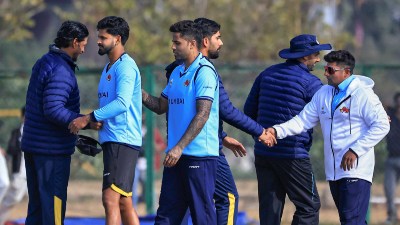King unbending, Nepal Maoists end ceasefire
A four-month spell of peace in Nepal came to an end today as the Communist Party of Nepal-Maoists CPN-M announced it would not extend the ...

A four-month spell of peace in Nepal came to an end today as the Communist Party of Nepal-Maoists CPN-M announced it would not extend the ceasefire that began in September, and vowed to resume its activities against the Royal Nepal Army RNA.
The announcement by CPN-M supremo Prachanda follows King Gyanendra8217;s rejection of an appeal by the world community, including UN Secretary General Kofi Annan, to reciprocate the CPN-M ceasefire and explore peace initiatives in the country. Nepal has been rocked by internal conflict and a total breakdown of the constitutional process since the takeover of power by the King.
Gyanendra reiterated his plan to hold elections to 57 municipal bodies on February 8 as a 8216;8216;better option8217;8217; to restore democracy in the country, although almost all the major political parties have decided not to participate in it. Maoists and the seven parties have declared that they would obstruct the elections.
Prachand8217;s statement said his party had decided not to extend the ceasefire8212;which ends at midnight today8212;in 8216;8216;self-defence8217;8217; as the RNA continued to target them in the remote Rolpa district even during the truce period.
8216;8216;We do appreciate the concern of and appeals from the UN, EU and other organisations to extend the ceasefire period, but doing so was not only impossible but also suicidal in the context that we mentioned above.8217;8217;
A prominent cabinet minister, however, said that the government was, in fact, considering reciprocating the ceasefire but Maoists spoilt it after they announced last week that they would target candidates and government officials on duty during the February municipal elections.
8216;8216;The blame for each drop of blood shed and every life lost because of the resumption of violence should now lie with the King,8217;8217; Nepali Congress Chief G P Koirala said.
Gyanendra8217;s refusal to listen to internal and international voices also raises fear that he might resort to more repressive measures, including banning political parties.
Prachanda said that the Maoists were ready to honour their understanding with the political parties should a situation for electing a constituent assembly under an all-party interim government arose.
8216;8216;Right to revolt against feudal tyranny is the biggest human right of the Nepalese today, and we appeal to the United Nations, international community and those who build world opinion to respect and honour that right of ours,8217;8217; Prachanda said.
India unhappy with Maoists decision
NEW DELHI: India on Monday described as 8216;8216;unfortunate8217;8217; the Maoist decision to end their four-month long ceasefire and go on the offensive for reasons of self-defence.
New Delhi underlined its position of strengthening the multi-party framework in Nepal and asked Maoists to stop using violent means.
8216;8216;This is unfortunate,8217;8217; the MEA Spokesperson said, adding that India had called upon the Maoists to abandon the path of violence .
- 01
- 02
- 03
- 04
- 05






























